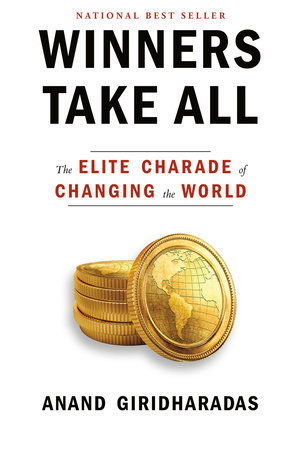
An insider's groundbreaking investigation of how the global elite's efforts to "change the world" preserve the status quo and obscure their role in causing the problems they later seek to solve.
Former New York Times columnist Anand Giridharadas takes us into the inner sanctums of a new gilded age, where the rich and powerful fight for equality and justice any way they can--except ways that threaten the social order and their position atop it. We see how they rebrand themselves as saviors of the poor; how they lavishly reward "thought leaders" who redefine "change" in winner-friendly ways; and how they constantly seek to do more good, but never less harm. We hear the limousine confessions of a celebrated foundation boss; witness an American president hem and haw about his plutocratic benefactors; and attend a cruise-ship conference where entrepreneurs celebrate their own self-interested magnanimity.
Giridharadas asks hard questions: Why, for example, should our gravest problems be solved by the unelected upper crust instead of the public institutions it erodes by lobbying and dodging taxes? He also points toward an answer: Rather than rely on scraps from the winners, we must take on the grueling democratic work of building more robust, egalitarian institutions and truly changing the world. A call to action for elites and everyday citizens alike.
KIRKUS REVIEW
Give a hungry man a fish, and you get to pat yourself on the
back—and take a tax deduction.
It’s a matter of some irony, John Steinbeck once observed of the
robber barons of the Gilded Age, that they spent the first two-thirds of their
lives looting the public only to spend the last third giving the money away.
Now, writes political analyst and journalist Giridharadas (The True
American: Murder and Mercy in Texas, 2014, etc.), the global financial
elite has reinterpreted Andrew Carnegie’s view that it’s good for society for
capitalists to give something back to a new formula: It’s good for business to
do so when the time is right, but not otherwise. Moreover, business has
co-opted philanthropy, such that any “world-changing” efforts come with a
proviso: “if you really want to change the world, you must rely on the
techniques, resources, and personnel of capitalism.” Philanthropic initiatives
to effect social change are no longer the province of public life but instead
are private and voluntary, in keeping with free market individualism.
Naturally, there’s a layer of consultants and in-house vice presidents to
manage all this largess, which hinges on the premise that things aren’t so bad
and just need to be nudged along. The author memorably calls this process
“Pinkering,” after the ameliorist-minded psychologist Steven Pinker. “It beamed
out so many thoughts about why the world was getting better in recent years,”
Giridharadas writes of one initiative, “that its antennae failed to detect all
the incoming transmissions about all the people whose lives were not improving,
who didn’t care to be Pinkered because they knew what they were seeing.” So
what’s so bad about private giving? Answers the author, when a society elects
to help, it expresses democratic values with an eye to equality, while private
giving is inherently unequal, a power relation between “the giver and the
taker, the helper and the helped, the donor and the recipient.”
A provocative critique of the kind of modern, feel-good giving
that addresses symptoms and not causes.
Of Interest
http://nymag.com/daily/intelligencer/2018/08/anand-giridharadas-on-winners-take-all.html
https://www.npr.org/2018/08/29/642688220/generous-giving-or-phony-philanthropy-a-critique-of-well-meaning-winners

1 comment:
Great Idea. This will help hungry people to eat.
Fabrics USA Inc
Post a Comment